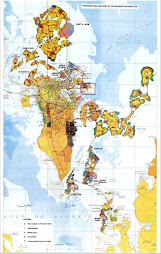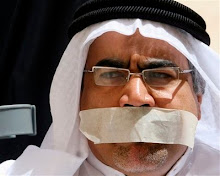HUSH
Abduljalil Alsingace
Bahrain: 8th June 2006
In almost a month, the Bahraini Authorities have sent different messages reflecting its maneuvering capabilities granted by Shaikh Hamad unilateral constitution of 2002. This includes legislative aspects; as in the case of passing Gatherings code, altering internal bylaws of the elected council, and the upcoming Terrorism Code. These signals covered constraining any oversight capabilities which has been exemplified by the urgent hand-over of the State budget for the years 2007-2008 and prohibition of questioning Ministers in public. Amidst these messages, one might wonder if this is the end of it, or would there be more tools? Does the elected chamber possess any capabilities to counteract these State measures?
Gatherings Code:
Because it was appalling, and due to exerted pressure outside the elected council, the State has backed down on its first draft for a new Public Gatherings code. Rather, the State recently introduced amendments to the old Gatherings Code (Decree No 18 of the year 1973). These changes introduce constraints on the freedom of expression and association in any form of public gatherings: processions, sit-ins, and even meetings in private household deliberating on public issues. It grants security individuals the privilege to intervene and call off any meeting on the basis of “endangering or disturbing State security and/or public order”. Those who show any form of disobey or violation to an order of annulling a meeting could face an imprisonment a month to a year or/and a fine of Bahraini Dinar 50-200 (US $ 133- 530), as per the new amendments.
This Code infringes the essence of rights, called upon by the universal declarations and the Convent of Civil and Political Rights. This Code has been passed by the Elected, to the Appointed Chamber (of State Appointed Members), which is not expected (cannot or allowed) to defy or reverse it back.
Handing over the next two years budget-on urgent basis:
There are two aspects of the State behaviour with regards to handing over the budget urgently at this time of the Elected chamber life span. The first is to apply pressure on the Elected members to enter in a deal or compromise to let go the budget with maximum ease. The second, is the fact that passing the budget in this hasty way, giving the elected chamber only 15 days for a discussions, deliberations and enquiries, as per Article 87 [Budget] of 2002 Shaikh Hamad constitution, which postulates that
” Every bill that regulates economic or financial matters, and the Government requests its urgent consideration, shall first be submitted to the Chamber of Deputies so that it takes a decision on it within fifteen days. When that period elapses, the bill is presented to the Consultative Council with the opinion of the Chamber of Deputies if there is such an opinion, so that the Consultative Council decides on it within a further period of fifteen days. If the two Chambers should disagree on the bill in question, the matter is referred to the National Assembly for a vote on it within fifteen days. If the National Assembly does not reach a decision on it within that period, the King may issue the bill as a Decree that has the force of a law.”
In actual fact, this could not be done in the prescribed period.
Now, why the State is opting to pass the next two years budget in this manner, could be attributed as follows. Firstly, to ensure that the next elected chamber has no oversight jurisdiction or enquiries concerned with the approved budget. Secondly, approving the ‘bonanza’ budget over a short period by elected members of an acquaintance with the government. Thirdly, the possibility of a compromise, initiated by the Elected chamber, and not by the State, to extend the current session, and postpone next election, a move convenient and favourable to both the elected members and the State.
No ministerial questioning in Public
Last week, the State succeeded to pass its vision with regards to publicly question ministers. Questioning used to be in public as per article 146 of the State-tailored and drafted Elected chamber by-laws. Such privilege has now been reassigned from being public to being behind doors in front of the specialized chamber sub-committee. The Authority once again proves its capabilities to over turn the by-laws and manipulate it in its favour, and not that of the people. Such change is in contradiction to all ‘democratic’ norms and practices, as well as nullifies the popular oversight from the chamber. It is a blatant indication that the practice in such chamber is pseudo democratic. It is worth mentioning that the Elected chamber has previously tried to alter its by-laws for more privileges and less constraints. All the attempts were a failure, as the State has the upper hand in the elected council.
Depriving the sentenced from their political rights:
This tactic was not used by the State on 2002 election, because it would have then tarnished an image lavishly promoted. Now that the Regime has received signals of unconditional support from the Americans and the British, it became so arrogant and declared its ban of their political rights (election and nomination) for ten years to all those sentenced for a period of six months or more, even there if they were pardoned. This is of course an act directed to those active in the last political unrest, during the nineties.
Role of politically naturalized in the election process:
The Authorities admit orientation of newly naturalized for political purposes to participate in the pseudo democratic process. This is in clear contradiction and violation to international norms, as it allows for activation of a plan to manipulate the outcome of that process. This clearly what happened in 2002, when naturalized Saudi citizens participated and played a role in swinging the votes for a particular candidate, in both the municipality and parliamentarian elections. This time, as indicated by spread news, the implementation of this tactic will be wide than before. It will cover districts of dense populations and known political and sectarian courses. It is anticipated, as a result, to observe an unexpected surprises or results in certain districts.
Have the State tactics been exhausted?
Because the so called ‘2002 constitution’ was tailored to give the Authorities the upper hand and the sole privilege, there are many tactics which could be implemented to curtail and constrain legislation and oversight capabilities, irrespective of the quality and the quantity of the participants. This is off course due to the gerrymandering of the election districts.
The previously mentioned messages is a demand by the Authorities to the those participants to raise the white flag “give-up” in the notion of oversight, as they did, overwhelmingly, in the legislation inside the pseudo parliament house. In conclusion, the Regime can initiate many tools and tactics and has the upper hand due to the following:
The clear loyal majority in the Elected house due to gerrymandering the districts on sectarian and tribal basis
The role of the Appointed House in legislation and oversight, as stated by Shaikh Hamad constitution.
Even if the Elected and Appointed chambers meet under the National Council, the first will have the upper hand, as it is headed by the head of its leader and can swing the decision to the side of the ruling family
With all the lump sump tactics at the disposal of the Regime with a minimal capability to raise voice tactic only, participation in pseudo reform program is helping him to go on in the plan of alienating people’s well and produce a counterfeit certification to the actual political and rights status in Bahrain.
skip to main |
skip to sidebar

خارطة البحرين الجديدة
Facebook Badge
Followers
فسيلة السنكيس
متى ما ظهرت الفسيلة - الصغير من النخل- من فوق سطح الأرض، فمن حقها أن تنمو وان تعانق السماء دون حصار أو مضايقة أو استهداف
حق الفسيلة في الحياة كحق غيرها، من المخلوقات، خاصة وإن كانت دليل أصالة شعب كشعب البحرين
--------------------------------------------------------------
صاحب المدونة: د.عبدالجليل السنكيس
ناشط، كاتب وباحث أكاديمي من البحرين
البريد الإلكتروني: asingace@gmail.com
مدونة اخرى: http://alsingace.katib.org/
هاتف:8179-3966-973+
حق الفسيلة في الحياة كحق غيرها، من المخلوقات، خاصة وإن كانت دليل أصالة شعب كشعب البحرين
--------------------------------------------------------------
صاحب المدونة: د.عبدالجليل السنكيس
ناشط، كاتب وباحث أكاديمي من البحرين
البريد الإلكتروني: asingace@gmail.com
مدونة اخرى: http://alsingace.katib.org/
هاتف:8179-3966-973+
مواقع ووصلات ذات صلة Links of Interest
صور معبرة

خارطة البحرين الجديدة






